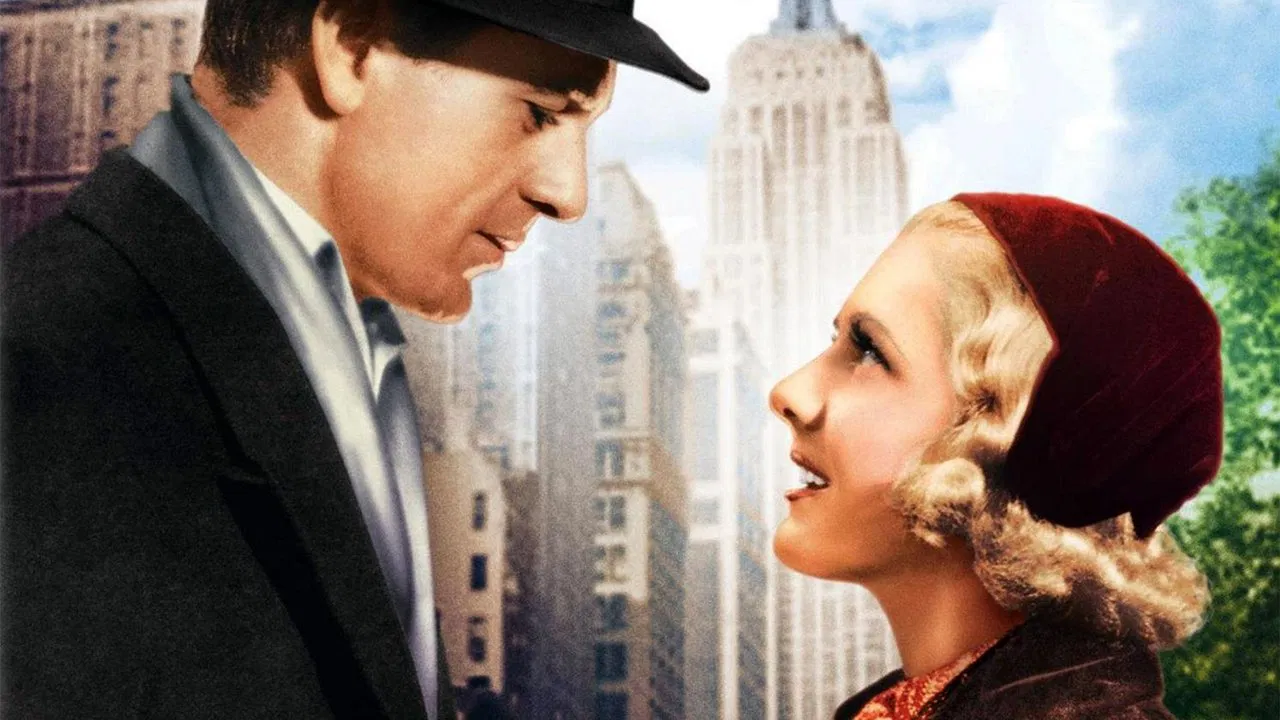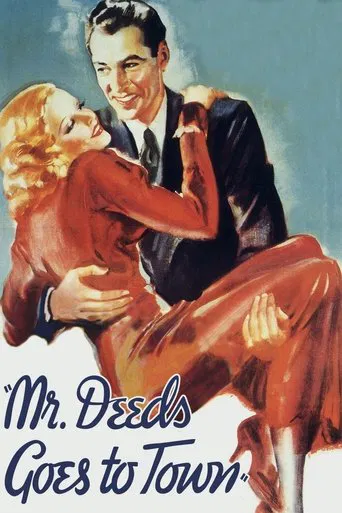Titreenp
SERIOUSLY. This is what the crap Hollywood still puts out?
Console
best movie i've ever seen.
Scotty Burke
It is interesting even when nothing much happens, which is for most of its 3-hour running time. Read full review
SimonJack
"Mr. Deeds Goes to Town" is a wonderful comedy-romance and drama that has more than subtle social commentary in its plot. The film is set in the middle of the Great Depression when unemployment in America was 15% to 20%. There's symbolism even in the title of the film and name of the hero – Deeds. The movie is about good deeds, especially in time of great needs, and with greed present even then. Longfellow Deeds leads a comfortable life in his small New England town of Mandrake Falls, Vermont. When he suddenly inherits $20 million, he is thrust into the limelight of the Big Apple. He soon comes to see moochers around every corner, but not from where they might be expected. Here, it's the well-to-do looking for a patron or patsy to bail out their favorite social venue or pet project. Into this dramatic scenario come romance and comedy – though both are gradual and even disguised. This is not a comedy of witty dialog or even crazy antics. It has some subtle humorous situations, and then a slam-bang hilarious courtroom scene at the end. It's one of the best courtroom comedy scenes on film. The performances all are fine, especially with the leads. Gary Cooper is excellent as Longfellow Deeds. I wonder if he really played the tuba. Jean Arthur gives a beautiful performance as Babe Bennett, a tough newspaper woman whose cold heart melts in the presence of "real goodness" – and romance, of course. Lionel Stander is superb as Cornelius Cobb, the publicity manager and protector for Deeds. And, Douglass Dumbrille is at his best as a conniving attorney, John Cedar. Deeds comments after shaking hands with him, "Even his hands are oily." H.B. Warner is very good as Judge May. The only character that wasn't that good was George Bancroft as MacWade, the tough newspaper editor. His laugh seems forced and unreal, and his bombastic, loud character is way overdone. Hollywood seemed to do that with all the newspaper editors in the films of the 30s and 40s to the point that it became stereotype. One other character worth mentioning is just a bit part by George "Gabby" Hayes. He has just a couple of lines, as a spokesman for the farmers to thank Longfellow Deeds. Any boy who grew up in the mid-20th century would recognize Gabby Hayes (1985-1969). Hayes was in more than 190 films, including many of the "B" Westerns cranked out in the 1930s and 1940s. He was a sidekick to Roy Rogers in his films for many years. Before that he played in many Westerns with Hopalong Cassidy (William Boyd), John Wayne and others. This film is the second of three to win director Frank Capra an Oscar. His first Oscar for directing was "It Happened One Night" of 1934, and his last was "You Can't Take it With You" of 1938. He received three other nominations, for "Lady for a Day" of 1933, "Mr. Smith Goes to Washington" of 1939, and "It's a Wonderful Life" of 1946. Those were up against great films, including major best pictures. Victor Fleming won best director in 1939 for "Gone With the Wind," and William Wyler won in 1946 for "The Best Years of Our Lives."My DVD of "Mr. Deeds" came with a 1999 Columbia Pictures short featurette that the IMDb Web site doesn't have listed for a film. It's entitled, "Frank Capra Jr. Remembers: Mr. Deeds Goes to Town." (EUE/Screen Gems Studios, Wilmington, NC, © 1999, Columbia Telstar Inc.) (IMDb has others of Frank Capra Jr. Remembers – Mr. Smith Goes to Washington, – It Happened One Night, – It's a Wonderful Life.") This featurette is the second time in which I've heard people from the film industry talk about Jean Arthur, especially how difficult it was to worth with her. Frank Capra Jr. says, "she was very insecure, almost neurotic." For as tremendous an actress as she was, she couldn't hide her anxiety and dread off-scree. She was "very difficult to get in front of the camera," Capra says. Once in front, she was great, but getting her there was the problem. Most of the time she wanted to stay in her dressing room. She seldom was ready and made excuses. "My hair's not done. I'm not ready. I don't feel like it." But in the end, Capra says, "you had to just almost drag her out in front of the cameras and say, 'Roll 'em! Film! Action! And then she would just come to life.""Mr. Deeds" is a classic comedy-romance from Hollywood's Golden Years that people should enjoy for decades to come. It's not high comedy, but its social commentary adds a touch of humaneness that gives it a lift
hikerhetav
I should confess before writing this review. Haven't I seen this movie before, I wouldn't be able to point out most handsome actor in Hollywood ever. Yes, Gary Cooper is one of the most handsome actors I've seen. He delivers his skills with effervescent and attractive face emotions that anyone could fall in love with. Now, the story revolves around some pixilated guy who has so charming skills to talk with people that anyone can easily get attracted to his simplicity, soberness and faithfulness. A guy who's been living in a small town with not much of important aspects ever faced has to move to the town and face modern societal structure and its aftermath. Now, one important message this film tries to share is-"However smart, sharp or deceit a town can be, a person who has everything good in him, everything elegant in him, can never be affected in a bad way until he himself tries to degrade him."Frank Capra has taken so lively, so real, so effective issue in 1930s,that is still applicable to this 21st century. A guy who sounds simple, looks simple does one pixilated thing that looks a psychologically mad thing to others. But in real, that only thing helps him to be brave, neat and adroit to solve one in a million case of deceit against him. That proves that however a bad state is revolving around anyone, if you stay simple, be free from wrongs, you can easily down the impossible against you. Coming to the movie, Gary Cooper is simply super. He has shown how a simple actor can manage a whole movie without any high-class techniques. Jean Arthur is cute as well as compelling. She delivers the most than she is expected of. Worth seeing an actress in a movie which requires a punchy role and also delivers the same without forcing too much. She was just natural into the frames. Director Frank Capra should be praised for bringing out most real issue on the screens to depict the reality of big cities and how easily one can live to the most. As simple as it is, this movie remains one of the most charming and funny movie of 1930's. The courtroom drama is shown well enough and humor is added rightly to make the audience engaged to get the required message in an enchanting way. With few of its flaws in the first half in acting and technical aspects, this remains one of a gem.
mmallon4
I'll admit that it took me a while for Gary Cooper to grow on me as an actor and to see his appeal under his minimalist, low key style of acting; but eventfully I got it. It's been said Cooper's face was the map of America; so why in under God did they cast Adam Sandler in a remake of Mr Deeds Goes to Town?Mandrake Falls is a town full of oddballs, and the naive but not a total dunce Longfellow Deeds comes off as a weirdo to the city dwellers who are fascinated by his behaviour and start mocking him. Mr Deeds Goes to Town certainly highlights the divide between city slickers and small town folk; this is particularly evident in the scene in which Deeds, himself a poet meets a group of distinguished poets in restaurant and is appalled by their snobbery and elitism to the point that he beats them up. Likewise the film also features Charles Lane as a lawyer, the inspiration for the The Simpsons blue haired lawyer. In an example of the darker side of Capra's films, Mr Deeds Goes to Town is a cynical look as society and the media as a whole ("Why do people seem to get pleasure out of hurting each other, why don't they try helping each other once in a while?"). Multiple people are out to snag Deed's fortune while the media is out constantly pursuing him due to his odd but ultimately harmless behaviour; the media manipulating how a person is seen by the public. Mr Deeds is a man who became famous for inheriting a fortune, in other words he's famous for being famous and the newspapers appear to have nothing better to do than report on his escapades such as feeding donuts to a horse; relevant to today's celebrity culture.With the scene in the park in which Babe plays a set of improvised drums and Deeds sings humoresque. Capra didn't want to include it as he thought it was too sappy but Jean Arthur insisted it remain. Capra of all people thought it was too sappy?! But ah Capra sentiment, it never fails to move me.The sanity hearing at the end of the film is pure movie fantasy; I doubt in real life someone could be classified insane on such so called evidence. In a demonstration of Cooper's ability as one of the best actors when it comes to giving a rousing speech or monologue, he talks about the silly quirks we all have. Although the likes of "o" filling or knuckle cracking seems rather trivial, I'm always left with the impression that the movie is making a statement on society's treatment of those who don't fully "fit in" or adhere to conformity and asks the question; who is truly "normal"?
richard-1787
The first part of this movie is a very well done romantic comedy, in which first-rate actors, led by a first-rate director (Capra), bring to very real, moving life a first-rate script.Then the farmer shows up with the gun, and the movie moves into a different realm, that where greatness resides.Deeds discovers the joy of helping his fellow man, or more specifically those of his fellow men who are willing to work to help themselves.At the same time, we see, through the lawyer, that dispersal of large fortunes - an issue in an era when there was still some respect for anti-trust laws - is presented as a threat to the very nation. Rather similar to the cries that came from our "too big to fail" banks when, after they caused the Great Recession, some in government tried to bring them under control.We also see that the powers of high finance can buy medicine - the psychiatrist from Vienna who doodles - to support their case. (This movie is almost frighteningly relevant to our own times.) We marvel at a man who realizes that the real happiness his fortune can buy is the chance to help those who need help, rather than to spend it on himself.This movie gets a 10 from me only because that's as high as the scale goes. Up until the farmer appears, it's a very well made romantic comedy. From there to the end, it's truly off the charts.

